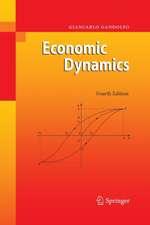Balanced Silverman Games on General Discrete Sets: Lecture Notes in Economics and Mathematical Systems, cartea 365
Autor Gerald A. Heuer, Ulrike Leopold-Wildburgeren Limba Engleză Paperback – 11 sep 1991
Din seria Lecture Notes in Economics and Mathematical Systems
-
 Preț: 360.02 lei
Preț: 360.02 lei -
 Preț: 383.93 lei
Preț: 383.93 lei -
 Preț: 384.09 lei
Preț: 384.09 lei -
 Preț: 380.07 lei
Preț: 380.07 lei -
 Preț: 446.26 lei
Preț: 446.26 lei -
 Preț: 497.37 lei
Preț: 497.37 lei -
 Preț: 380.84 lei
Preț: 380.84 lei -
 Preț: 384.86 lei
Preț: 384.86 lei -
 Preț: 378.34 lei
Preț: 378.34 lei -
 Preț: 399.67 lei
Preț: 399.67 lei - 20%
 Preț: 360.93 lei
Preț: 360.93 lei - 15%
 Preț: 643.16 lei
Preț: 643.16 lei -
 Preț: 379.09 lei
Preț: 379.09 lei -
 Preț: 404.74 lei
Preț: 404.74 lei -
 Preț: 385.62 lei
Preț: 385.62 lei - 15%
 Preț: 644.49 lei
Preț: 644.49 lei -
 Preț: 379.09 lei
Preț: 379.09 lei -
 Preț: 345.50 lei
Preț: 345.50 lei -
 Preț: 425.80 lei
Preț: 425.80 lei -
 Preț: 378.34 lei
Preț: 378.34 lei - 18%
 Preț: 775.65 lei
Preț: 775.65 lei -
 Preț: 392.60 lei
Preț: 392.60 lei -
 Preț: 401.61 lei
Preț: 401.61 lei - 15%
 Preț: 646.43 lei
Preț: 646.43 lei -
 Preț: 382.18 lei
Preț: 382.18 lei -
 Preț: 378.34 lei
Preț: 378.34 lei - 15%
 Preț: 637.59 lei
Preț: 637.59 lei - 15%
 Preț: 647.27 lei
Preț: 647.27 lei -
 Preț: 377.73 lei
Preț: 377.73 lei -
 Preț: 447.84 lei
Preț: 447.84 lei - 15%
 Preț: 644.49 lei
Preț: 644.49 lei -
 Preț: 386.00 lei
Preț: 386.00 lei - 15%
 Preț: 654.43 lei
Preț: 654.43 lei -
 Preț: 415.02 lei
Preț: 415.02 lei -
 Preț: 411.54 lei
Preț: 411.54 lei -
 Preț: 398.92 lei
Preț: 398.92 lei -
 Preț: 398.92 lei
Preț: 398.92 lei -
 Preț: 392.75 lei
Preț: 392.75 lei - 15%
 Preț: 635.47 lei
Preț: 635.47 lei - 20%
 Preț: 653.56 lei
Preț: 653.56 lei -
 Preț: 379.86 lei
Preț: 379.86 lei -
 Preț: 495.46 lei
Preț: 495.46 lei -
 Preț: 447.99 lei
Preț: 447.99 lei -
 Preț: 378.71 lei
Preț: 378.71 lei - 15%
 Preț: 637.13 lei
Preț: 637.13 lei -
 Preț: 385.84 lei
Preț: 385.84 lei -
 Preț: 378.54 lei
Preț: 378.54 lei - 15%
 Preț: 666.55 lei
Preț: 666.55 lei -
 Preț: 380.07 lei
Preț: 380.07 lei
Preț: 381.21 lei
Nou
Puncte Express: 572
Preț estimativ în valută:
72.95€ • 75.73$ • 60.83£
72.95€ • 75.73$ • 60.83£
Carte tipărită la comandă
Livrare economică 22 martie-05 aprilie
Preluare comenzi: 021 569.72.76
Specificații
ISBN-13: 9783540543725
ISBN-10: 3540543724
Pagini: 152
Ilustrații: V, 140 p.
Dimensiuni: 170 x 242 x 8 mm
Greutate: 0.25 kg
Ediția:Softcover reprint of the original 1st ed. 1991
Editura: Springer Berlin, Heidelberg
Colecția Springer
Seria Lecture Notes in Economics and Mathematical Systems
Locul publicării:Berlin, Heidelberg, Germany
ISBN-10: 3540543724
Pagini: 152
Ilustrații: V, 140 p.
Dimensiuni: 170 x 242 x 8 mm
Greutate: 0.25 kg
Ediția:Softcover reprint of the original 1st ed. 1991
Editura: Springer Berlin, Heidelberg
Colecția Springer
Seria Lecture Notes in Economics and Mathematical Systems
Locul publicării:Berlin, Heidelberg, Germany
Public țintă
ResearchCuprins
1. Introduction.- 2. Games with saddle points.- 3. The 2 by 2 games.- 4. Some games which reduce to 2 by 2 when ? ? 1.- 5. Reduction by dominance.- 6. Balanced 3 by 3 games.- 7. Balanced 5 by 5 games.- 8. Reduction of balanced games to odd order.- 9. Reduction of balanced games to even order.- 10. Games with ±1 as central diagonal element.- 11. Further reduction to 2 by 2 when ? = 1.- 12. Explicit solutions for certain classes.- 13. Concluding remarks on irreducibility.- References.














